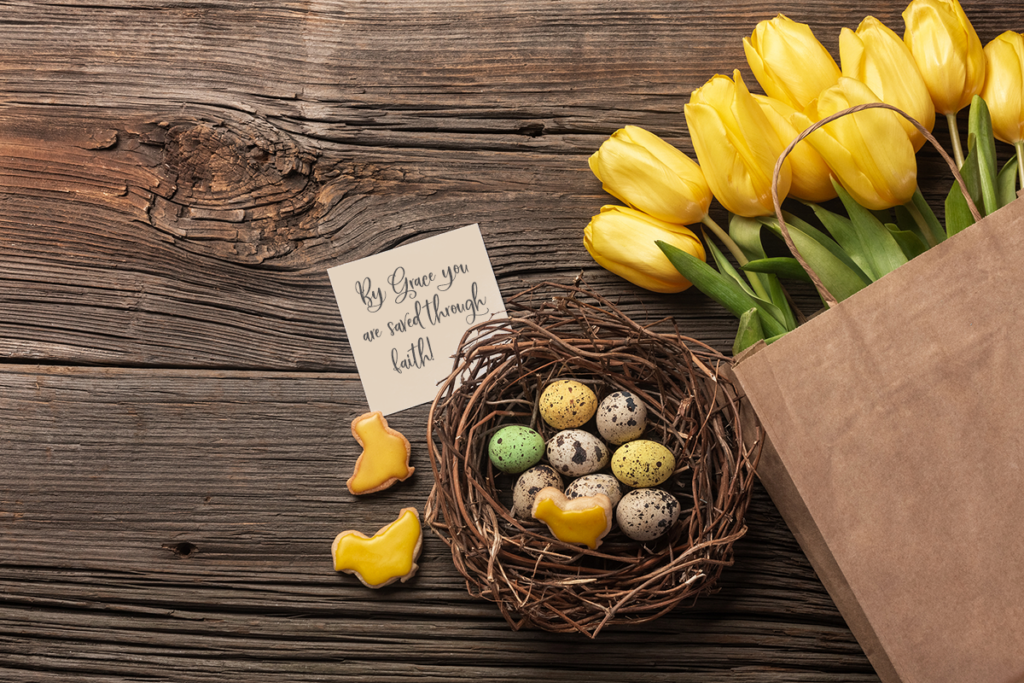
If you would like to join this FREE Bible study, click through to part one where you’ll find all the information you need to get started click here.
If you would prefer to pick up a copy of the study guide instead of printing the lessons out, The Life of Joseph: A Type of Christ is available now at Amazon.com. When you purchase a copy of the study guide you’re helping to support this ministry as we share the gospel with over 500,000 women around the world.
Week 3 – Concluding Thoughts on Genesis Chapter 41

Have you ever noticed that what you’re reading in the Bible right now is often what you’re living right now? I have, especially when it comes to this Bible study on the life of Joseph. I started writing it in December and finished around mid-February. COVID-19 was the farthest thing from my mind at the time, and yet God was teaching me lessons I’d be using today.
He’s been teaching me to control my thoughts, to wait on His timing, to trust in His wisdom, and to lean on His strength. He’s teaching me to prepare my heart for these upcoming months. He’s teaching me that uncertainty brings the best things in life to the surface.
We’re not seeing an exact parallel in this chapter to what’s going on in the news, but I do see a striking resemblance as Joseph predicts a major world crisis. He instructs Pharaoh to prepare for the upcoming famine by storing a surplus of grain.
In a similar manner people across the country have been storing up grain for the last couple of weeks. Running through Costco they stock up on toilet paper, hand sanitizer, and soap. Carts overflow with Kleenex, canned beans, dried pasta, and soup. Panic and pandemonium have overtaken our sense of peace when we need it the most.
I’m not saying these warnings should be taken lightly. I’m not saying it’s easy, or that we shouldn’t prepare. But the real issue is, where is your head and your heart in all this? Are you preparing out of anxiety and fear? Are you storing up more than you should?
Is that really the point of this chapter? Is panic and hoarding the way of our Lord? Or could it be that there’s more to this story than storing up grain? Could it be that there’s a deeper lesson that He’s trying to teach us through this?
Jesus says, “Therefore I tell you, do not worry about your life, what you will eat or drink; or about your body, what you will wear. Is not life more than food, and the body more than clothes? Look at the birds of the air; they do not sow or reap or store away in barns, and yet your heavenly Father feeds them. Are you not much more valuable than they? Can any one of you by worrying add a single hour to your life?” (Matthew 6:25-27, NIV)
The Greek word for worry there is “merimnaō” (strong’s G3309), which means “to be anxious or troubled with cares.” We might wonder and we might be uncertain, but we shouldn’t be troubled with cares that are out of our hands.
I can’t tell you how many times this week I’ve heard the word “but” from anxious people around me.
But we could all be unemployed.
But the economy could fail.
But we could be facing a major recession or depression.
But we could all land up sick.
But we could lose our house.
Any one of those things could happen, but the fact still remains that I’m in the palm God’s hand and that nothing can happen apart from His will.
Who can speak and have it happen if the Lord has not decreed it? Is it not from the mouth of the Most High that both calamities and good things come? (Lamentations 3:37-38, NIV)
I don’t know what the future holds, but here’s the thing: God does, and this doesn’t surprise Him one bit. One thing I know for sure in all this is that He doesn’t want us to panic—He wants us to lean on His strength through this difficult time.
Yes, Joseph was advising the Egyptians in this chapter, but they weren’t believers, they were Gentiles. As believers we have a different mentality than the rest of the world, or at least we should. Where’s our peace in all this? Where’s our joy in all this? Where’s our hope-filled reliance on God in all this? Don’t let your circumstances rob you of peace.
Matthew 6:31-32 says, “Therefore take no thought, saying, ‘What shall we eat? or, What shall we drink? or, Wherewithal shall we be clothed?’ (For after all these things do the Gentiles seek) for your heavenly Father knoweth that ye have need of all these things.”
Trust in the Lord as you let each day unfold in its own time and in its own way.
Week 3 – Concluding Thoughts on Genesis Chapter 42

In Chapter 42 we see Jacob’s family starting to get hungry. There was a famine in the land and Jacob knew that if they didn’t get the grain that they needed to survive, they could die. In other words, they needed salvation.
We see a parallel here between the physical world and a spiritual one, where Joseph is the source of bread and Jesus is the bread of life.
Then Jesus declared, “I am the bread of life. Whoever comes to me will never go hungry, and whoever believes in me will never be thirsty.” (John 6:35, NIV)
And so, the brothers set off on their journey to Egypt expecting to buy themselves grain. But here’s the interesting thing in all this: money is never exchanged. In fact, verse 25 says, “Joseph gave orders to fill their bags with grain, to put each man’s silver back in his sack, and to give them provisions for their journey. After this was done for them, they loaded their grain on their donkeys and left.”
In much the same way, people expect to buy their way in when it comes to salvation. As if being good, or attending a church is the price that we pay for God’s grace. The fact is that God’s grace is a free gift that can’t be purchased or earned by the work that we do.
For it is by grace you have been saved, through faith—and this is not from yourselves, it is the gift of God—not by works, so that no one can boast. (Ephesians 2:8-9, NIV)
This entire chapter mirrors God’s grace. What they see as trial after trial is Joseph’s way of drawing them closer to him. He loves them, he wants the best for them, he wants them all to be saved.
The spiritual parallels in this chapter run even deeper than this. Verse 8 tells us that Joseph recognized his brothers, but they didn’t recognize him, and so what does he do? He hides himself from them—he doesn’t reveal his true identity until the timing is right.
Now, remember his brothers are Israelites. That’s important to understanding the parallels we find in New Testament as we look at God’s relationship with the Jews. He loves them, He has compassion for them, and they will be reconciled to Him yet again. But for now, He has hidden Himself from His brethren.
As it is written: “God gave them a spirit of stupor, eyes that could not see and ears that could not hear, to this very day.” (Romans 11:8, NIV)
The Jews have been expecting a Messiah since the beginning of time. They know that He is coming, they know the Old Testament scriptures that point directly to Christ, but they don’t recognize Him the way that you and I do, and so they rejected him.
Paul goes on to say,
“I do not want you to be ignorant of this mystery, brothers and sisters, so that you may not be conceited: Israel has experienced a hardening in part until the full number of the Gentiles has come in, and in this wayall Israel will be saved. As it is written: “The deliverer will come from Zion; he will turn godlessness away from Jacob. And this is my covenant with them when I take away their sins.” (Romans 11:25-27, NIV)
On the surface one might not recognize Joseph’s behavior as an act of compassion and love. He speaks roughly to the brothers, he accuses them of being spies, he holds one of them in prison, and he tests them. Why is he doing all this? So that they might come to understand their need for a savior.
Remember the law and the ten commandments; remember their purpose. They weren’t written to give anyone a feel-good journey through faith. The law was implemented to convict mankind of our sin. It’s the sting of the law that leads us to salvation through Christ.
In 2 Corinthians 3, Paul refers to this ministration of death as glorious, because he knows that our present suffering is nothing compared to the glorious future that lies ahead!
If the ministry that brought condemnation was glorious, how much more glorious is the ministry that brings righteousness! For what was glorious has no glory now in comparison with the surpassing glory. (2 Corinthians 3:9-10, NIV)
Free Printables
I’ve created some 8.5 x 11 high res images for you with some of the thoughts and verses from this study. I’ll have two of them for you each week, making a collection of 12 of them in total. Please click the images or the links below to view and print your copies.



Darlene Schacht and her husband Michael live in Manitoba Canada where the summers are beautiful and the winters are cold. Together they’ve come to learn that relationships aren’t always easy, but that marriage, the way God intended it to be, is a treasure worth fighting for.
She began her publishing journey about twelve years ago when she pioneered one of the first online magazines for Christian women, known at the time as “Christian Women Online Magazine.” After three years, Darlene left CWO to blog as a solo author at Time-Warp Wife Ministries.
It was also during this transition that she worked alongside actress Candace Cameron Bure to write the NYT Best-Selling book, Reshaping it All: Motivation for Spiritual and Physical Fitness. Reshaping it All was the winner of both the 2011 USA Best Book Awards and the 2012 Christian Reading Retailers Choice Awards.
Author of more than 15 books, Darlene continues to write and to minister to her readers through her blog at TimeWarpWife.com.
Connect with Darlene:
Facebook: @timewarpwife
Instagram: @timewarpwife
Pinterest: @timewarpwife
Twitter: @timewarpwife
You are loved by an almighty God,
Darlene Schacht
The Time-Warp Wife

